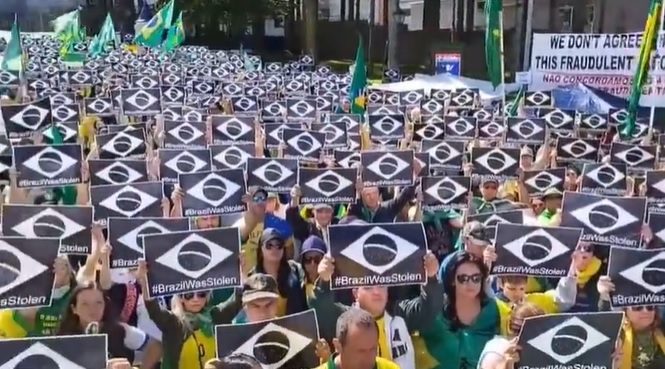by Werner Pfluck and Ryan Hartwig, The Gateway Pundit:

About 40 days ago, Brazil held the second round of its general elections, which were supposed to define the President of the Republic, governors, senators and federal and state deputies. What was supposed to end the tension that started long before the election campaign only served to increase the pressure. Millions of Brazilians are revolted by the results presented by the Electoral Justice, not because they are sad with the defeat, but because the whole process is full of illegalities, arbitrariness and serious and consistent accusations of fraud.
TRUTH LIVES on at https://sgtreport.tv/
The restlessness of the majority of the population stems from the clearly biased behavior of the TSE, the Superior Court of Electoral Justice, and of some members of the STF, the Federal Supreme Court, who are members of both courts, appointed by the former governments of the Workers’ Party (PT), whom they seemed to favor in this election. The current president of the Electoral Court has long been a political ally of the elected vice president with Lula da Silva, PT candidate.
Lula is a former president who was sentenced for corruption to 21 years in prison, convicted in common law, with the conviction confirmed in the Appellate Court (TRF, in the acronym in Portuguese) and later in the Supreme Court of Justice (STJ). But he had all the processes annulled by a friend appointed by his party to the STF, Justice Edson Fachin, so that he could participate in the elections again. Fachin’s decision was supported by other court justices, who had been openly opposing President Bolsonaro since the beginning of his term in 2019.
These justices prevented the implementation of the printed ballot along with the electoral machines, forcing the population to rely exclusively on the data presented by the electoral software. The Army, which together with other institutions accompanied the preparation of the machines and the entire electoral process, identified many failures in the system that allowed a risk of manipulation and fraud and presented suggestions for the solution of these problems.
The Electoral Justice, however, ignored the alerts and accused the Army of intending to disturb the elections. The population, realizing that something was not right, took to the streets several times to protest and ask for transparency in the elections. Millions of people gathered in the capitals and in many cities in the interior, thus forming the largest protests in the history of Brazil, but they were also ignored. Many were even prosecuted and fined large sums by Justice Alexandre de Moraes for “attacks on democracy and institutions”, among other unclear arguments. Influencers, journalists and parliamentarians have been banned from social media, conservative TV channels and magazines were censored, and they were all included in criminal proceedings for their opinions, and are being tried without their lawyers being able to access their criminal cases.
When the election finally took place, in two rounds, on the 2nd and 30th of October, many statistically impossible anomalies emerged. For example, in many electronic voting machines, incumbent candidate Jair Bolsonaro obtained zero votes, even in regions where his popularity is very high. It was also noticed by the companies that carried out analysis of data obtained from the electoral system that older model machines, which had not been audited before the election, had a greater advantage for candidate Lula than the 2020 model, which had been audited. In these, Bolsonaro took advantage.
Before the election, the Electoral Justice prevented Bolsonaro’s campaign from showing images of the crowds that supported him, prohibited him from reminding the people of Lula’s corruption convictions, and even allowed many more election ads to be published on the radio for Lula than for Bolsonaro. In Brazil, electoral advertising on radio and TV is paid by the government for all candidates. Bolsonaro’s party presented this complaint and also the result of the audit that demonstrated that there were many anomalies in the election that would need to be explained. Moraes ignored the accusations and fined the party about the equivalent of $4.2 million USD.
These and other unexplained questions enraged millions of people, including many indigenous tribes from the Amazon. As the National Congress no longer has much credibility, because it never reacted to the illegalities committed by justices of the Supreme Court and Electoral Justice, and many congressmen even applaud these crimes because they favor their candidate Lula, the people decided to ask the Army for help. The Brazilian Constitution allows the Army to act in certain situations to restore law and order. All over the country, in cities where there are Army headquarters, people have been protesting and asking for help for over 40 days. In Brasilia, in front of the Army General Headquarters, the number of people camped is huge, and this weekend it received reinforcements from hundreds of thousands of people.
Read More @ TheGatewayPundit.com




